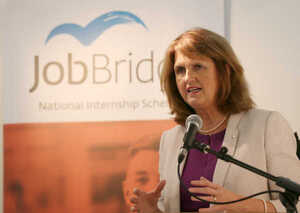Above: Joan Burton and Margaret Heffernen
Low hour contracts and useless internships.
How Dunnes Stores and the Labour Party devalued work.
Julien Mercile writes;
We live in a world of smoke and mirrors where words are turned upside down to hide the simple fact that ordinary people are being exploited by elites. For example, if words reflected reality, the “Labour Party” would be renamed the “Employers Party”, and Joan Burton, the “Minister for Social Protection”, would be renamed “Minister for Social Dismantlement”.
Last week, more than 6,000 Dunnes workers throughout the country staged a one-day strike. The problem is their zero-hour or low-hour contracts. These require that the workers be available to work, but they don’t guarantee a decent number of hours of work per week. Therefore employees never know how much income they will receive every week. The time of their shifts also changes, so they can’t plan childcare, leisure, or anything.
The Dunnes workers want guaranteed hours of work to ensure they’re not shuffled around as Dunnes’ owners see fit. This is not a revolutionary or radical request: others do guarantee hours, including Tesco, Arnotts, Marks & Spencers, to name a few.
Of course, this is a way for employers to control labour. Employees who make too many requests for better conditions or want to organise can see their hours cut or their shifts moved to hours which they can’t attend. That’s why 85% of Dunnes workers said that one method of control on the part of management is to preserve the system of insecure hours of work.
Actually, work conditions at Dunnes are so bad that Dunnes is the company that hires the most workers who depend on social welfare in the country. More than 1,200 of their employees depend on social welfare to top up their irregular Dunnes income.
Meanwhile, the chief of Dunnes Stores, Margaret Heffernan, is very comfortable. Her net worth is estimated at €600 million. She has a luxury home in Barbados. She has another luxury home in Stillorgan in south Dublin which she is currently remodeling by joining three other houses with an extension including a cinema and an indoor swimming pool.
It is telling that when Margaret Heffernan took over the company in 1993, about 80% of Dunnes Stores workers were full-time. Conversely, today, 80% of staff is on part-time contracts that guarantee only 15 hours a week. Most staff are young and female.
The situation has created enough of a stir for Joan Burton to make a public relations appearance for a few minutes standing next to the workers on strike in front of the cameras.
But the Labour Party has contributed to the casualisation of labour, unemployment, and bad work conditions over the last few years. This has been done in three main ways.
1) Austerity: Support for austerity has deepened economic problems, increased unemployment, and prevented the economy from recovering. That’s the fundamental issue on which the current government should be judged—and kicked out of power.
2) Labour “reform” (another word that’s supposed to make us think it’s a great thing) for those lucky enough to still have a job: The workforce in the public sector has been reduced by 32,000 since 2008, at a time when the population has been growing and demand on public services is increasing. That’s on top of pay cuts and other schemes to increase management’s control over workers, even when management itself is incompetent.
3) Degrading work conditions by compelling the unemployed to reintegrate the workforce under bad conditions: The best known example of this is JobBridge, but there are many other similar programmes. JobBridge is a national internship scheme that provides work experience placements for interns who are paid only €50 per week on top of their existing social welfare entitlement, which equates to an hourly wage of €3.65 for a 40-hour week.
This amounts to a huge subsidy to the private sector, which accounts for approximately two thirds of internships. Effectively, the rise of internships has replaced a range of full-time employment opportunities that would likely have been made available anyway in the absence of the programme. There is little doubt that businesses have been using the scheme to replace paid work and the difference is going directly to the bottom line.
To take one example, Tesco has been using JobBridge to advertise for positions such as filling shelves according to merchandising plans and ensuring that customers do not have to queue while other companies such as fast food chain Sbarro have used it for finding pizza chefs.
Despite the abuse of the programme, the minister responsible for it—Joan Burton—has defended it explaining that it has been much praised “particularly by the employers” which is hardly surprising given that they are the main beneficiaries.
Democracy is not just about voting once every four years for a short menu of parties that essentially all care about elites, not ordinary people. Real democracy involves people having a say over matters that affect their lives.
A crucial part of this is economic democracy, which means workers having a say over their work conditions and the business they work in. After all, we spend one third of our waking life at work, so that’s an important chunk of time. That’s what the Dunnes workers are attempting to do.
Economic democracy is also about citizens having a say in how the government taxes them and the corporate sector and how it spends those taxes. That’s what water charge protestors are trying to influence, just like many progressive groups around the country.
They face opposition from the established parties, who know very well that the success of those campaigns will translate automatically into a loss of power for elites and into a redistribution of power and income toward ordinary people. No wonder they’re scared and react hysterically to mild media reports that even dare mentioning the protests.
@JulienMercille is lecturer at UCD and the author of The Political Economy and Media Coverage of the European Economic Crisis: The Case of Ireland (2015, Routledge). His new book, Europe’s Treasure Ireland, will be out in July 2015.
(Photocall Ireland)



